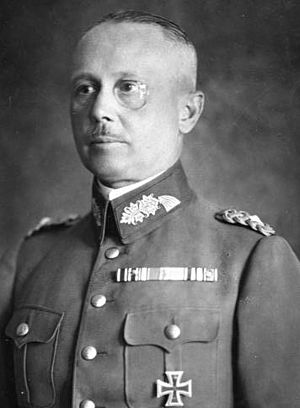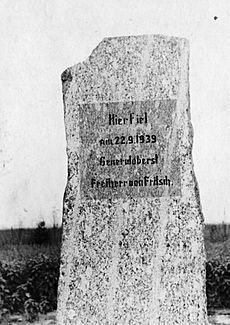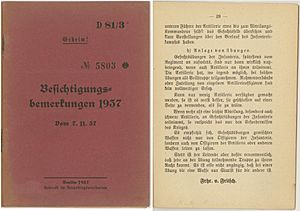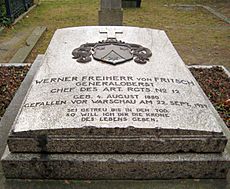Werner von Fritsch facts for kids
Quick facts for kids
Generaloberst
Werner Freiherr von Fritsch
|
|
|---|---|

Von Fritsch in 1932
|
|
| Supreme Commander of the German Army | |
| In office 1 June 1935 – 4 February 1938 |
|
| Chancellor | Adolf Hitler |
| Preceded by | Office established |
| Succeeded by | Walther von Brauchitsch |
| 5th Chief of the German Army Command | |
| In office 1 February 1934 – 1 June 1935 |
|
| President | Paul von Hindenburg Adolf Hitler |
| Chancellor | Adolf Hitler |
| Preceded by | Kurt von Hammerstein-Equord |
| Succeeded by | Himself as Commander-in-Chief of the German Army |
| Personal details | |
| Born |
Thomas Ludwig Werner von Fritsch
4 August 1880 Benrath, Landkreis Düsseldorf, Rhine Province, Kingdom of Prussia, German Empire |
| Died | 22 September 1939 (aged 59) Warsaw, Poland |
| Resting place | Invalidenfriedhof, Berlin |
| Military service | |
| Allegiance | |
| Branch/service | |
| Years of service | 1898–1939 |
| Rank | |
| Commands | 1st Cavalry Division 3rd Infantry Division Supreme Commander of the Army |
| Battles/wars | World War I
World War II
|
| Awards | Order of the Red Eagle |
Werner von Fritsch (born August 4, 1880 – died September 22, 1939) was a high-ranking German military leader. He served as the Commander-in-Chief of the German Army from February 1934 to February 1938. He was forced to leave his position after false accusations were made against him. This event helped Adolf Hitler gain more control over the German armed forces. Just before World War II began, Fritsch was called back to serve as a Colonel-in-chief. He died in battle in Poland early in the war. He was the second German general to die in that conflict.
Contents
Early Life and Military Beginnings
Werner von Fritsch was born in Benrath, which was part of the German Empire at the time. He joined the Prussian Army when he was 18 years old. In 1901, he moved to the Prussian Military Academy to continue his training. By 1911, he was appointed to the German General Staff, where he worked during World War I.
Between the World Wars
Serving the Weimar Republic
After World War I, Fritsch served in the armed forces of the Weimar Republic, which was Germany's government at the time. He was involved in the secret rearmament of Germany during the 1920s. This was done to get around the rules of the Treaty of Versailles, which had limited Germany's army size and forbidden it from having aircraft or tanks. Fritsch worked closely with the Soviet Union on this secret rearmament.
He was promoted to major-general in 1932.
Under Nazi Rule
When the Nazis came to power in 1933, Fritsch supported the new government. He believed it could bring positive changes to Germany. On February 1, 1934, he became the Chief of the Army Command. This was partly because Hitler saw him as a supporter.
Fritsch was promoted to colonel general on April 20, 1936. He was also given the authority of a minister, though not the formal title. In January 1937, Hitler gave him a special award and made him a member of the Nazi Party.
Fritsch was present at the Hossbach Conference on November 5, 1937. During this meeting, Hitler announced his plans to go to war as early as 1938. Fritsch was concerned about this plan because he knew the army was not ready for such a conflict. He even considered resigning from his command.
The Blomberg–Fritsch Affair
Heinrich Himmler and Hermann Göring, two powerful Nazi leaders, made false accusations against Fritsch. Because of these accusations, he was forced to resign from his position on February 4, 1938. His replacement was Walther von Brauchitsch, whom Fritsch himself had recommended. Hitler used this situation to replace several generals and ministers with people loyal to him, which gave him more control over the German armed forces.
It soon became clear that the charges against Fritsch were false. An honor court of officers reviewed the case, and Fritsch was found innocent on March 18. However, the damage to his reputation had already been done.
After he was cleared, Fritsch wanted to challenge Himmler to a duel to defend his honor. He even practiced his pistol skills. However, General Gerd von Rundstedt convinced him not to go through with it. Hitler had also forbidden high-ranking party members from dueling.
Despite the false charges, Fritsch remained loyal to the Nazi government.
World War II and Death

Just before World War II started, Fritsch was called back to duty. He chose to personally inspect the front lines during the invasion of Poland. This was unusual for someone of his high rank. On September 22, 1939, during the Siege of Warsaw, Fritsch was hit by a Polish bullet. It tore an artery in his leg, and he died shortly after.
Werner von Fritsch was the second German general to be killed in combat during World War II. The first was SS commander Wilhelm Fritz von Roettig on September 10, 1939. Because Fritsch was a high-ranking general, his death was carefully investigated. The official report suggested he might have deliberately sought death. However, Field Marshal Wilhelm Keitel, another high-ranking officer, later wrote that Fritsch was hit by a stray bullet while talking to his staff and bled to death quickly.
Fritsch received a special state funeral four days later in Berlin.
Commemoration
After his death, a military barracks in Darmstadt was named "Freiherr von Fritsch Kaserne" in his honor. When the United States Army took control of Darmstadt in 1945, these facilities were combined with another barracks. The combined "Cambrai-Fritsch Kaserne" was returned to German control in 2008.
Images for kids
-
Commemorative stone placed by Germans where Fritsch died. It was destroyed in 1944 during the Warsaw Uprising.
See also
 In Spanish: Werner von Fritsch para niños
In Spanish: Werner von Fritsch para niños





